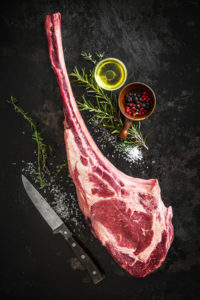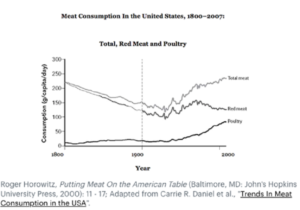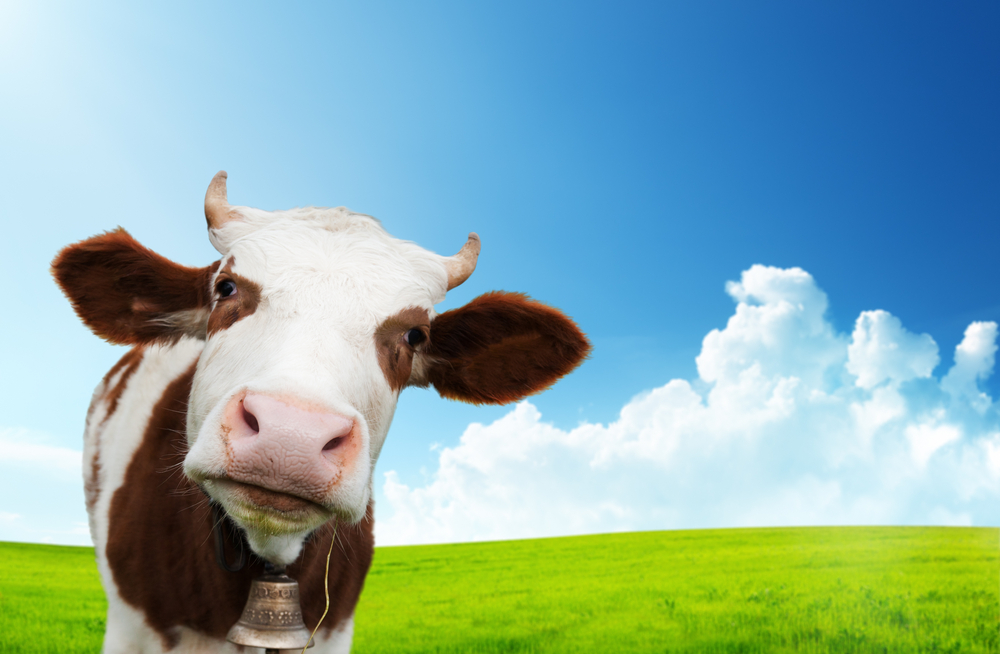Last week, the cooking website Epicurious announced via Twitter that they are “cutting out beef…this isn’t a vendetta against cows or people who eat them. It’s a shift about sustainability; not anti-beef but pro-planet.”
The standout response from someone (and I’m guessing here) who likes beef is, “I’m cutting out Epicurious…with a steak knife.”
And so it goes. I don’t know which is stranger: that meat has become so intensely partisan, or that, without fail, a stampede of dubious puns accompanies every discussion around it.
First, let’s be honest: Epicurious is on a vendetta, having taken upon itself to decide what constitutes “pro-planet” foodstuffs. Beef, safely enshrouded in the prevailing zeitgeist, was an easy target. Regardless of complexities or facts to the contrary, cows have been skewered often and widely enough as “bad” that it makes the marginal marketing risks pretty low. Any schoolkid can gigglingly lecture you about cow-farts and the atmosphere, making the “cutting out beef” stance a painless posture within the eco-woke establishment–virtue signaling without the tedious homework.

Second, let’s be honest the other way ‘round, too: the kinds of people who grill up a 36-ounce Tomahawk Ribeye in righteous indignation are not the kinds of people who were likely to have downloaded a recipe for it in the first place.
So what do we have here? A side-skirmish in the culture wars? It certainly helps folks decide which team they’re on, but it’s more than that. It’s an example of the kind of inflammatory, reflex-inducing clickbait that dissuades any meaningful introspection.
I suspect, for instance, that very few of the Epicurious in-crowd have spent a great deal of time either in a feed pen or on a kill floor. Their finger-wagging therefore feels tendentious and arrogant. In the same breath, however, I sincerely doubt if very many of the devoted carnivore set have either.
And do you want to know why? Because it’s a mess.
Anyone who’s driven through Dalhart, Texas knows you can see the brown haze and smell the acrid stench from miles away—courtesy of the tens, perhaps hundreds, of thousands of feeder cattle penned in bare-dirt bunker yards. It’s not exactly a “touristy” place and absolutely doesn’t resemble the bucolic pastures splashed on your average package of grocery store beef. The meat we eat (and we eat more of it, though less of beef, than we have in a while*) doesn’t magically appear on our plates, and it’s darn tricky to sort out what the implications are.

For example, anyone who knows cattle will have a hard time agreeing with the PETA-folks that the animals in these feedlots are “miserable” or mistreated—I stand by a bet that if you threw open the gates to green pasture next door, the majority of Dalhart’s bovine denizens would be back by dusk, bellying up to their ration.
And yet: visit the kill-line of the JBS Tolleson slaughter facility, and watch as the stunner-man, with his ceiling-mounted bolt gun does his once-a-second dirty work. It’s not pretty—we have collectively outsourced the “honorable kill” our grandfathers used to do, to a minimum wage line worker and something moral is lost in the transaction. Yet neither is a modern slaughter facility generally the hell-scape implied by the grainy, carefully edited, smuggled footage that is trotted out for propaganda purposes by the anti-meat (sorry—“pro-planet”) folks.
This pro-planet thing, though: to adequately begin to address the “sustainability” concerns expressed by Epicurious would take approximately a million more words, but suffice it to say it’s also—yep—complicated. Nothing is hinted at in the “cutting out beef” tweet that mentions the potential global implications of regenerative grazing, the massive gains to wildlife habitat from intensive agriculture, or the debatable science around bovine climate impacts. To be fair, the website has a more cogent defense of its rationale here, but even in long-form it trivializes many of the major complexities surrounding beef production and consumption. For instance, it repeats the oft-mistaken, nearly always misinterpreted “percent of greenhouse gas emissions” attributed to livestock–you can read anywhere from 14-25% depending on how radical the source. Yet according to cooler heads, it’s closer to 3.3%, which pales in comparison, frankly, to the transportation and electricity generation sectors (56% in the U.S.). If we are going to have a full and honest conversation about anthropogenic emissions, perhaps we should add automobile drivers and Epicurious’s web servers to the grab-bag of bugaboos. Of the 2,358 “Beef” results on the Epicurious website, I’d say the one for caramelized onion steak-burgers might be the most enlightening.
Nothing is free in this world, and no choices are without repercussions. And in that sense, I honor Epicurious’s spirited, if perhaps vacuous position. It matches the spirited and vacuous stance of the rest of us who imply that our meat-eating habits are somehow more “American” than the liberal elite are. Yet there is nothing very “traditional” about eating your body-weight in meat (twice as much as our World War I great-grandfathers) and Epicurious, annoying as it might be, forces a reasonable question: how much is enough?

Epicurious, obviously, is basically saying “zero,” which is both unrealistic and likely to be rife with unintended consequences. How many people, in the flurry of media attention have cooked up a Solidarity Steak? I know I have.
The Greek Epicurus, who is not getting any royalties for Epicurious’s heist of his name (non sum, non curo), was a founding philosopher of the school of being content with what you have—of “enoughism,” if you will. So I’ll grant, it’s worth thinking about. Deeply. I wish I could write a morally conclusive piece here, showing persuasively that one side or the other is on the right side of the arc of history or whatever. But I can’t, because there isn’t one. My daughter is a vegetarian and going strong, and my only response when I’m teased about being the rancher whose kid won’t eat meat is: “I am large—I can contain contradictions.” Perhaps the rest of us can too.
Paul is Director of the Agrarian Freedom Project and is a PhD candidate in 16th Century New Spain at the University of Kansas. Paul holds a Master’s degree in Government from Harvard University and studied History and Science at the United States Air Force Academy.


READER COMMENTS
Henry
May 8 2021 at 11:41am
Throughout history many people-probably most people- ate what they could. Most farmer/peasants ate the products of their labor minus the portion extracted by their local lord in the form of rent or taxes. Their intake was low enough that population growth was very slow. Then came the industrial revolution, the green revolution, and cybernetics. Let’s recognize that we have very fortunate lives. Only very rich people are in a position to turn down a steak. I consider myself very lucky to have more than I need to eat. Now that my belly is full, it is reasonable for me to think about the impact of that steak on my health and on the health of my environment. I once quit eating chocolate for the sake of my waistline; that first piece after three years of denial was fantastic. I am trying to temper my intake of chocolate, ice cream, and steak, but I recognize that my need to do so is a reflection of my great fortune in being alive during this period of time.
Phil H
May 8 2021 at 12:39pm
Er… what?
The parts where you admit that it’s complicated seem OK. There are some problems with the rest of the article.
For example:
“Epicurious is on a vendetta, having taken upon itself to decide what constitutes “pro-planet” foodstuffs.” – this is not what vendetta means.
“making the “cutting out beef” stance a painless posture” – this claim comes not 100 words after you pointed out that at least one website reader decided to reject the website as a result. So, not painless, then.
“the kinds of people who…the kinds of people who…” – you don’t give any evidence of knowing anything about these people beyond media stereotypes, so this is 100% content-free.
The topic seems OK, but your eagerness to be fashionably anti-woke makes the article much harder to read than it should be.
Thomas Lee Hutcheson
May 8 2021 at 1:33pm
Without a tax on net CO2 emissions, to price the harm done from CO2 accumulation in the atmosphere, it’s hard to know if beef is less “sustainable” than lots of other consumer items.
robc
May 9 2021 at 10:57pm
You are wrong, its not hard at all. Price it with coasean bargaining instead.
Thomas Lee Hutcheson
May 10 2021 at 9:30am
Isn’t that what a pigou tax is? I declare that I am willing to pay more for everything I buy in return for a share of the revenue collected from everyone who emits a molecule of CO2 into the atmosphere net of what is paid out to those who permanently remove a molecule. How do I co agout completing this bargain?
How does you kind of Coasian bargaining work in the net CO2 emissions space? I declare that I am willing to pay more for everything I buy in return for a share of the revenue collected from everyone who emits a molecule of CO2 into the atmosphere net of what is paid out to those who permanently remove a molecule. How do I go about completing this bargain?
Dylan
May 8 2021 at 1:33pm
I agree with much of what you write, but this part strikes me as at least a little questionable:
For part of my youth I lived next to a cattle farm in land much like you describe. I’ve visited countless others over the years throughout the U.S. I know I can tend to overly anthropomorphize, but those cows always struck me as both stupid and kind of sad. Same thing for the cows in India that always appear to be mostly starving to death. I had kind of thought that was just how cows looked, until I visited Western Ireland. I challenge anyone to walk up to one of the cows lying in the lush green pastures there and tell me they aren’t much happier than their U.S. counterparts.
Peter Gerdes
May 9 2021 at 11:03am
I think cows are just inherently sad looking. It’s the big eyes I think.
Dylan
May 9 2021 at 4:03pm
That’s what I thought before I saw Irish cows. They exude peace and serenity.
David Seltzer
May 8 2021 at 8:29pm
PETA! People Eating Tasty Animals.
Frank
May 8 2021 at 8:38pm
Anybody who likes animals so much should not eat their food.
Thomas Lee Hutcheson
May 9 2021 at 7:48am
Until we have a tax on net CO2 emissions we will not know what is sustainable (everything) and what is not (unprofitable activities). If beef eating remains a thing with a tax on net CO2 emissions it will be “sustainable.”
robc
May 9 2021 at 10:58pm
Repeating it doesn’t make it less false.
Peter Gerdes
May 9 2021 at 11:02am
Interesting piece but I object to the casual use of moral as a synonym for something which makes us uncomfortable. We’ve seen through history thay many very moral things like sexual liberation, women working out of their home, interracial marriages etc all initially triggered people to feel uncomfortable.
I eat cows (though not chicken as I fear they are net suffering) and I have sat and watched a cow get slaughtered. Cows are easy to sympathize with as large mammals but I don’t let my emotions control what I think is moral. Yes, mass slaughter makes me feel uncomfortable but not in an way I trust as verdical (sp?)
Frank
May 9 2021 at 1:38pm
Upon further thought, there is an undercurrent of forbidding pleasurable things in all these movements.
Plantfeeder
May 10 2021 at 1:47am
Interesting how all this is over a minute trace gas that is completely absorbed(scrubbed)from the atmosphere by water vaper. Methane oxydizes in the atmosphere and becomes water vapor. It is really a non-sequeter in the climate discussion as any honest climate scientist will tell you. That’s getting hard to find these day.
Comments are closed.